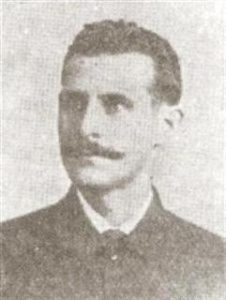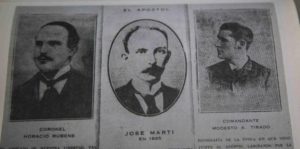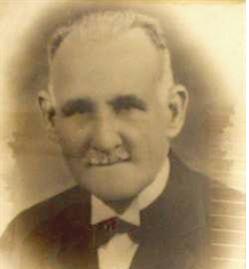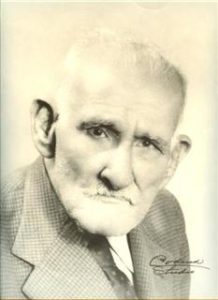HISTORIA DE CUBA: MODESTO A. TIRADO, CUBANO-PUERTORRIQUEÑO Y PATRIOTA.
En la ciudad borinqueña de Ponce, el 8 de octubre de 1866, nació Modesto Arquímedes Tirado Avilés quien más tarde, como mucho de sus compatriotas, amalgamaría las dos alas de un mismo pájaro en la ruta de la independencia Cubana, fue Comandante del Ejército Libertador de Cuba y amigo de José Martí.
Entre los jóvenes detenidos el 12 de agosto de 1886 en Puerto Rico acusados de conspirar contra el gobierno español y el general Romualdo Palacios, encontrábase Modesto Tirado; sin embargo, la intervención de su maestro de escuela logra excarcelarlo bajo la condición de abandonar el país en el primer barco que zarpara. Se iniciaba así un periplo que como a todo desterrado pasando por Venezuela y Santo Domingo reuniendo algún dinero lo conduciría a Nueva York.
Su carta de presentación en la ampulosa urbe, lo es el noble oficio de tipógrafo. Inmediatamente busca trabajo y lo logra en una imprenta, además de relacionarse con varios paisanos. En 1888 ya trabajaba en el periódico El Porvenir, y de él testimoniaría Enrique Trujillo, director del rotativo.
En N.Y. huía de todas las reuniones sociales, aunque se le llamaba, sólo asistía a las políticas. En la emigración hispanoamericana de Nueva York, se llegó a considerar a Tirado como un carácter y un corazón”.
En la conformación definitiva de la actitud de Tirado para con Cuba su causa, la relación con José Martí desempeñaría, sin duda alguna, papel preponderante. El borinqueño tiene noticias del Apóstol de la independencia cubana estando en Santo Domingo; y es la prosa modernista, esa nueva manera de decir en las letras hispanoamericanas inaugurada por Martí, la que por vez primera impacta a Tirado. No obstante, la militancia incondicional no le llega hasta después de haber escuchado con fruición su verbo el 10 de octubre de 1888, cuando en el Masonic Hall de Nueva York el padre de la dignidad cubana pronuncia un discurso en homenaje al inicio de la Guerra Grande, a partir de aquí y como el mismo Tirado declara fue “[…] un creyente fanático más del evangelio que predicaba aquel orador […]”
Trabajó con afán Modesto Tirado en Nueva_York. Escribió en varios periódicos y el dominio de la tipografía, en especial del oficio de cajista, lo hicieron acreedor de merecidos elogios, de su persona en este sentido dijo Martí: “De manos del puertorriqueño Modesto Tirado, hombre generoso y artista de la imprenta ha salido con la cubierta azul, el libro nuevo de Rafael Serra.”
Anteriormente había acompañado a Martí en numerosas actividades previas a la creación del Partido Revolucionario Cubano, y en el frugal banquete ofrecido en Nueva York para celebrar el acontecimiento de haber establecido las bases del mismo, Tirado pronunció un breve discurso y brindó por su fundador.
El 24 de Febrero de 1895 se iniciaba la gesta independentista preparada con maestría por José Martí, y Tirado, resuelto y ansioso, le declara a Trujillo: “Si no salgo en la primera expe¬dición de Nueva York, me voy a Cuba solo. He parado mucho plomo y ahora quiero derretirlo”. Y efectivamente lo derritió. El 19 de agosto de 1895 desembarca en Nibujón, ensenada de Taco-Taco cerca de Baracoa, había venido en el vapor “León” buque que condujo la expedición comandada por Francisco Sánchez Echevarría. Días después, el 23, incorporado a las fuerzas del coronel Félix Ruenes, recibe su bautismo de fuego en El Naranjal, sosteniendo combate con las fuerzas españolas destacadas en Baracoa y nutrida guerrilla de aquella comarca.
Después del desembarco decide quedarse al lado de José Maceo y en Octubre es nombrado subteniente, ayudante del general, este último -guerrero de los mejores- apreciando altamente sus servicios escribe a Tomás Estrada Palma: “Habrá expedicionarios que valgan tanto como Tirado, pero ninguno más que él”. El 6 de enero de 1896 fue nombrado teniente, y el 30 de agosto del mismo año designado Secretario del Gobierno Civil de Oriente. Cúpole también a Tirado la honra de encontrarse entre los redactores de El Cubano Libre, periódico fundado en la manigua por Antonio Maceo Grajales, que ponderado altamente por el general sería calificado como la artillería de la revolución.
El año de 1897 marca su ascenso a comandante de Estado Mayor, aunque desde antes ostentaba el grado de capitán. Después de la La Yaya, es nombrado Jefe de Despacho de la Presidencia, y este cargo representó un jalón más en su ascensión por los peldaños del mejoramiento humano; en tanto de Bartolomé Masó Márquez aprendió a respetar, “sobre todas las cosas, los derechos inalienables del ciudadano. Y a ser tolerante que era la virtud mayor, entre las muchas que poseía tan gran patriota”.
De vuelta a Manzanillo y detentando el cargo de Jefe de la Subalterna Hacienda de Manzanillo, en 1900 es elegido alcalde municipal por espacio de un año, desechando la proposición para un nuevo mandato.
Respetado y admirado por todos, recibió el borinqueño las más altas muestras de cariño por parte de Cuba y Manzanillo. En 1942 la Sociedad de Geografía e Historia de Oriente lo proclama Presidente de Honor y extiende un pergamino en reconocimiento a sus “grandes méritos como combatiente en nuestra epopeya libertadora, como escritor de recia envergadura y como notable historiador”.
Y cuando el 7 de enero de 1952 a las 2:00 a.m fallecía en Manzanillo, aquel hombre que un día un periodista señaló como reliquia humana, cerrábase un capítulo más en nombre de la libertad, pues bien, muy bien aprendió Tirado, que patria es humanidad, y su vida y obra, ligadas al destino de Cuba como si fuera el de su Puerto Rico natal, así lo rubricaron.
Palabras dichas por Modesto A. Tirado Avilés en ocasión de entregársele el título de Hijo Adoptivo de la Ciudad de Manzanillo.
“Yo soy oriental porque en esta he luchado, desde que puse mi planta en este suelo fecundo, en la zona de Baracoa, y allí contemplé por vez primera el glorioso sacrificio de los cubanos que morían dignamente en defensa de su libertad y reclamo de independencia. Yo soy oriental, porque como ayudante del general José Maceo, que era un legítimo santiaguero, testifiqué el valor temerario de aquel esforzado paladín que diariamente desafiaba la muerte. Yo soy oriental porque los nobles hijos de esta región de Cuba fueron los más abnegados defensores de la libertad, que invadieron todo el territorio cubano hasta Occidente. Y soy oriental y manzanillero, con orgullo, porque estimo mi timbre más preciado el serlo. Y además será para mí satisfactorio en extremo el que mis restos descansen en esta bella tierra en la que reposarán también mis seres más queridos y la legión de adalides de la libertad que lucharon por la independencia y la felicidad de Cuba”.
CUBAN HISTORY: MODESTO A. TIRADO, CUBAN-PUERTO RICAN AND PATRIOT
In the borinqueña city of Ponce, 8 of October of 1866, was born Modesto Arquímedes Tirado Avilés that later, like much of his compatriots, would amalgamate the two wings of a same bird in the route of the Cuban independence, was Commander of the Liberating Army Of Cuba and friend of José Martí.
Among the youths arrested on August 12, 1886 in Puerto Rico accused of conspiring against the Spanish government and General Romualdo Palacios, was Modesto Tirado; However, the intervention of his schoolmaster managed to release him under the condition of leaving the country in the first ship that sailed. Thus began a journey that as everything banished going through Venezuela and Santo Domingo collecting some money would take him to New York.
His letter of introduction in the bombastic city, is the noble office of typographer. Immediately he seeks work and achieves it in a printing press, in addition to relating with several countrymen. In 1888 already worked in the newspaper the Porvenir, and of him Enrique Trujillo, director of the newspaper.
In N.Y. He fled from all social gatherings, although he was called, he was only attending politics. In the Hispanic-American emigration of New York, Tirado was considered as a character and a heart. ”
In the definitive conformation of Tirado’s attitude towards Cuba his cause, the relationship with José Martí would undoubtedly play a preponderant role. The Borinqueno has news of the Apostle of Cuban Independence being in Santo Domingo; And it is the modernist prose, that new way of saying in the Spanish-American letters inaugurated by Martí, that for the first time impacts Tirado. Nevertheless, the unconditional militancy does not reach him until after having listened with joy his verb the 10 of October of 1888, when in the Masonic Hall of New York the father of the Cuban dignity pronounces a speech in tribute to the beginning of the Great War , From here and as the same Tirado states was “… a fanatic believer more of the gospel that preached that speaker …”
He worked with Modesto in New York. He wrote in several newspapers and the mastery of typography, especially the office of a writer, earned him well-deserved praise of his person in this sense said Martí: “From the hands of the Puerto Rican Modesto Tirado, generous man and artist of the press has Out with the blue cover, Rafael Serra’s new book. ”
He had previously accompanied Marti in numerous activities prior to the creation of the Cuban Revolutionary Party, and at the frugal banquet offered in New York to celebrate the event of establishing the bases of the same, Tirado gave a brief speech and offered by its founder.
On February 24, 1895, the pro-independence struggle was begun by Jose Marti, and Tirado, resolved and anxious, declared to Trujillo: “If I do not go out on the first expedition to New York, I am going to Cuba alone. I’ve stopped a lot of lead and now I want to melt it. ” And it actually melted it. On August 19, 1895, he arrived in Nibujón, Taco-Taco cove near Baracoa. He had come in the steamer “León” which led the expedition commanded by Francisco Sánchez Echevarría. Days later, the 23, incorporated to the forces of the colonel Félix Ruenes, receives its baptism of fire in the Naranjal, sustaining combat with the Spanish forces emphasized in Baracoa and nourished guerilla of that region.
After the landing he decides to stay next to José Maceo and in October he is appointed second lieutenant, assistant of the general, this last one – warrior of the best – highly appreciating his services writes to Tomás Estrada Palma: “There will be expeditionaries that are worth as much as Tirado, more than him”. On January 6, 1896 he was appointed lieutenant, and on August 30 of the same year appointed Secretary of the Civil Government of Oriente. He also took Tirado the honor of being among the editors of El Cubano Libre, a newspaper founded on the manigua by Antonio Maceo Grajales, which weighted highly by the general would be qualified as the artillery of the revolution.
The year of 1897 marks its promotion to commander of Staff, although from before it boasted the degree of captain. After the La Yaya, he is appointed Head of Office of the Presidency, and this position represented one more milestone in his ascent by the steps of human improvement; While Bartholomew Masó Marquez learned to respect, “above all, the inalienable rights of the citizen, and to be tolerant that he was the greatest virtue, among the many that possessed such a great patriot.”
Returning to Manzanillo and holding the position of Chief of the Subalterna Hacienda de Manzanillo, in 1900 he was elected mayor for a year, discarding the proposal for a new term.
Respected and admired by all, the Puerto Rican received the highest signs of affection on the part of Cuba and Manzanillo. In 1942 the Society of Geography and History of the East proclaims President of Honor and extends a parchment in recognition of its “great merits as a combatant in our liberating epic, as a writer of great importance and as a notable historian.”
And when, on January 7, 1952, at 2:00 a.m., Manzanillo died, that man one day a journalist said as a human relic, another chapter was closed in the name of freedom, well, It is humanity, and its life and work, linked to the destiny of Cuba as if it were the one of its native Puerto Rico, so they signed it.
Words spoken by Modesto A. Tirado Avilés on the occasion of giving him the title of Adoptive Son of the City of Manzanillo.
“I am an Oriental because I have fought since I laid my plant on this fertile ground in the Baracoa area, and there I saw for the first time the glorious sacrifice of the Cubans who died in dignity in defense of their freedom and claim of independence I am an Oriental, because as an assistant to General José Maceo, who was a legitimate Santiago, I testified to the reckless valor of that hard-working champion who daily defied death.I am Oriental because the noble sons of this region of Cuba were the most selfless defenders Of liberty, which invaded all the Cuban territory to the West.And I am Oriental and Manzanilla, with pride, because I esteem my most precious timbre to be it.And it will be extremely satisfying for me that my remains rest in this beautiful land in the Which will also rest my loved ones and the legion of liberals who fought for the independence and happiness of Cuba.
Agencies/EcuRed/Internet Photos/Extractos/Arnoldo Varona/TheCubanHistory.com
THE CUBAN HISTORY, HOLLYWOOD.



 HISTORIA DE CUBA: Modesto A. Tirado, Cuban-Puerto Rican and Patriot. + CUBAN HISTORY: Modesto A. Tirado, Cubano-Puertorriqueño y Patriota.
HISTORIA DE CUBA: Modesto A. Tirado, Cuban-Puerto Rican and Patriot. + CUBAN HISTORY: Modesto A. Tirado, Cubano-Puertorriqueño y Patriota.








